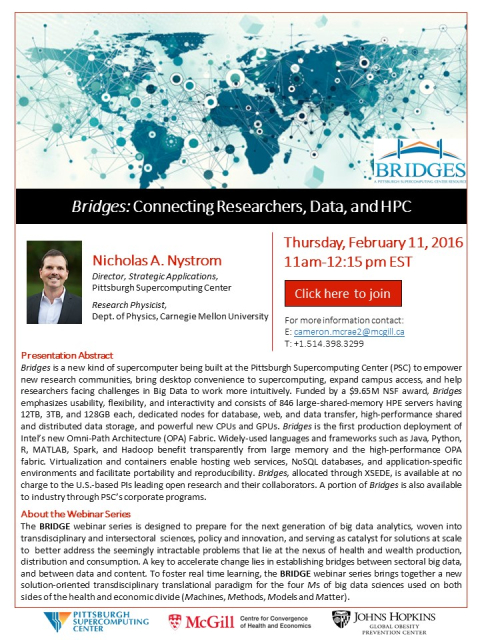Nicholas Nystrom presents at the BRIDGE Webinar Series

Presentation Abstract
Bridges is a new kind of supercomputer being built at the Pittsburgh Supercomputing Center (PSC) to empower new research communities, bring desktop convenience to supercomputing, expand campus access, and help researchers facing challenges in Big Data to work more intuitively. Funded by a $9.65M NSF award, Bridges emphasizes usability, flexibility, and interactivity and consists of 846 large-shared-memory HPE servers having 12TB, 3TB, and 128GB each, dedicated nodes for database, web, and data transfer, high-performance shared and distributed data storage, and powerful new CPUs and GPUs. Bridges is the first production deployment of Intel’s new Omni-Path Architecture (OPA) Fabric. Widely-used languages and frameworks such as Java, Python, R, MATLAB, Spark, and Hadoop benefit transparently from large memory and the high-performance OPA fabric. Virtualization and containers enable hosting web services, NoSQL databases, and application-specific environments and facilitate portability and reproducibility. Bridges, allocated through XSEDE, is available at no charge to the U.S.-based PIs leading open research and their collaborators. A portion of Bridges is also available to industry through PSC’s corporate programs.
Nicholas Nystrom
Dr. Nick Nystrom is director of strategic applications at the Pittsburgh Supercomputing Center (PSC). He earned his BS degree from the University of Pittsburgh, majoring in chemistry, math, and physics and went on to his PhD in theoretical chemistry, working with Professor Ken Jordan, a pioneer in large-scale quantum chemistry. During that time, Nick also completed PhD coursework in physics and amplified his focus on computational science. Considering positions in industry and at PSC, he chose the latter for its broad spectrum of research and positive impact on enabling academia and industry. Dr. Nystrom currently leads development of hardware and software architectures to enable breakthroughs in data analytics and simulation, for example, converging high-performance computing and Big Data to create new kinds of uniquely capable and highly usable computing platforms. A few of his other research interests include discovering causal relationships in Big Data, graph analytics, and genomics.
About the Webinar Series
The BRIDGE webinar series is designed to prepare for the next generation of big data analytics, woven into transdisciplinary and intersectoral sciences, policy and innovation, and serving as catalyst for solutions at scale to better address the seemingly intractable problems that lie at the nexus of health and wealth production, distribution and consumption. A key to accelerate change lies in establishing bridges between sectoral big data, and between data and content. To foster real time learning, the BRIDGE webinar series brings together a new solution-oriented transdisciplinary translational paradigm for the four Ms of big data sciences used on both sides of the health and economic divide (Machines, Methods, Models and Matter).